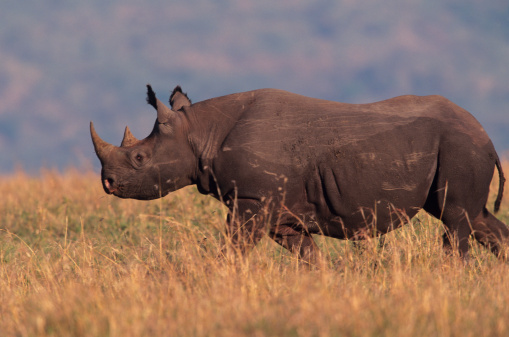Company Seeking to Save the Rhinos Put Out of Business by Humane Society
After a long campaign, the Humane Society of the United States has succeeded – in making life harder for endangered rhinoceroses.
One of the biggest threats to rhinos today is poaching, with poachers typically seeking to remove and sell their horns on the black market in Asian countries, where horn is considered to have medicinal qualities. Rhino horn is made from keratin, a naturally produced protein that also makes up hair and nails. But despite best efforts on the ground with security forces, poachers have still been able to kill many rhinos.
That’s where Pembient, a startup company based in Seattle, came in with a solution: Manufacturing lab-grown rhino horn.
Pembient’s hope was that by pushing poach-free lab-grown horns, actually poached horns would be worth significantly less due to an increased supply from a cruelty-free product. With this source of revenue dried up, poachers would stop hunting rhinos – the effort and risk of doing so no longer being worth the profit made.
We say “was” because Pembient is expected to go out of business this year, due in no small part to lobbying from the Humane Society of the United States (HSUS).
HSUS and its affiliated organizations have reportedly been making calls to investors in Pembient, which have now successfully dried up the company’s funding.
Why? HSUS objected to the work of Pembient to save rhinos. HSUS argued that the synthetic horns would “attract new customers, who would not have otherwise purchased rhinoceros horns, to the market.”
However, this is economically illiterate. Pembient’s strategy to flood the market with identical, bio-fabricated horn would crater the price of horn. Poachers only risk getting killed because there’s money in the horn trade.
Here’s respected journalist John Stossel obliterating a representative of HSUS for opposing this pragmatic solution:
HSUS argues that the focus should be on reducing demand for rhino horn. That approach can have a positive effect, but it can take decades to change cultural attitudes and beliefs in Asian countries. While cultural practices that consume endangered species are obviously wrong, Pembient promises an effective short-term solution on the supply side.
Pembient’s real threat was to expose how little HSUS has accomplished. Despite years of raising money off poaching, we’re unable to determine whether HSUS has been able to help African animals at all.
While poaching has continued to be a problem in the past decade, a review of the tax return for Humane Society International, HSUS’s international arm, finds that the organization donates little money to sub-Saharan Africa.
On its latest tax return, Humane Society International reports only spending four percent of its revenue in grants to sub-Saharan Africa. That money, reports HSI, went to things such as “promoting plant-based eating” and “promoting spay/neuter of cats and dogs.” Addressing the wildlife trade is in there, too, but it’s unclear how much is actually going towards that versus encouraging Africans to be vegan. Either way, it doesn’t amount to much: HSI spent more money on its executives’ compensation than it did on grants to sub-Saharan Africa.
We suspect that HSUS is a lot of talk and not a lot of walk. It’s just a shame that they have to try to bring others down.




